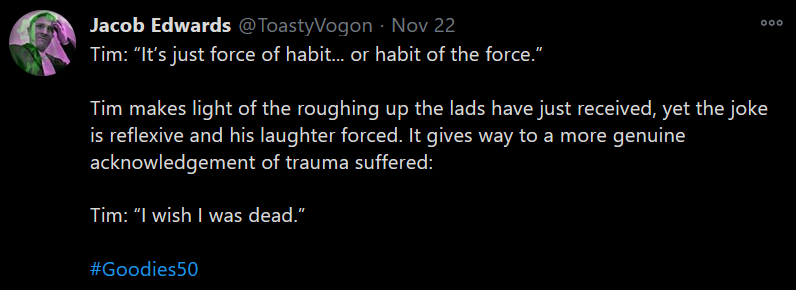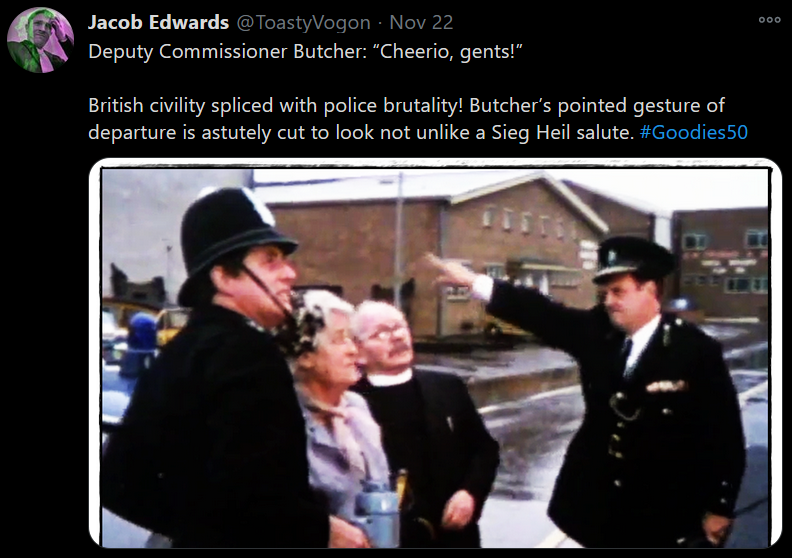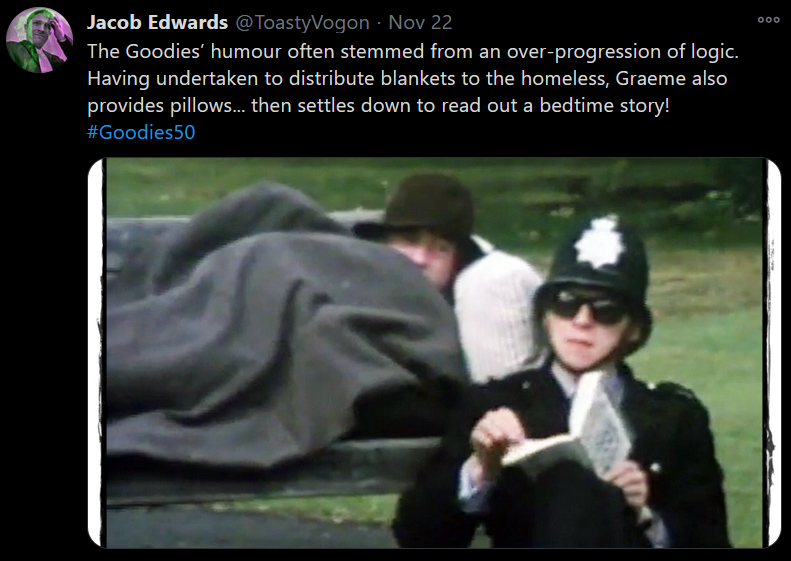Give Police a Chance
22 November 1970
Not to keep harping on about the opening credits but it seems I’m the victim (perpetrator?) of a mondegreen. All these years, I’ve heard:
‘a sausage or a can of beer’
as:
‘a sausage or a can of beans’
[hence presumably the Heanz Meanz Beanz mock commercials];
and:
‘stripper or a clown, prices going down’
as:
‘zipper on a clown, flies are going down’
which actually seems more in keeping with the Goodies’ ethos, no? Well, I’m claiming it as an improvement!
Anyway, to episode three…
‘Give Police a Chance’ is the first of the Goodies’ hard-hitting, socially minded offerings. It constitutes, at least on the surface, a bludgeoned-home protest against police brutality. The script is clever and the performances first-rate, especially from guest star Paul Whitsun-Jones (as the compulsively belligerent Deputy Commissioner Butcher) and Roland MacLeod (his equally pugnacious Sergeant).[1]
Butcher comes to the Goodies because the police force has an image problem, yet even when soliciting their help he cannot refrain from being a violent, bullying, extortionist killjoy. The humour rests largely on the mercurial contrast between Butcher the supplicant and Butcher the authoritarian aggressor. The interactions are fast-moving and over-the-top yet also at times sublimely subtle. In one early scene Butcher puts Bill in a deadening armlock, demanding:
‘It’s not good. Our image is not good, is it? What is it? What is it? Eh-eh-eh? What is it?”
When Bill confesses (‘It’s not good!’), Butcher releases him (‘Yes! You’re right, you horrible little man.’) and then beats him repeatedly with his police truncheon, expounding to the rhythmic stress of the blows:
‘Our image is not good! We want you to help us change our image!’
There’s a childlike singsong happiness in this act. Graeme responds with similar innocence, smiling his understanding while pointing at Butcher’s demonstration:
‘Oh, I see!’
Butcher treats this as both interruption and protest, and points back:
‘Sergeant, kill him.’
The sergeant then delivers a savage chop to Graeme’s neck. His expression suggests utter contempt of time-wasters. Graeme drops out of picture like a yanked-back Muppet. It’s a very fast cutaway, its briefness reflective of how blithely both policemen deploy violence. The entire scene is brilliantly executed.
From here we get a double-dose of musical Goodies—first as nominally everyday citizens testing the level of police hostility (to the song ‘Needed’), then as their own brand of hippie policemen spreading love and joy (to ‘What Do I Have To Do To Make You Love Me?’). These sequences bookend a halftime interlude specifically tailored to the plot, and include some quality absurdist-tinged gags: Butcher directing the painting of a no-parking line, for instance, while Graeme frantically tries to keep the trandem out of range; or Graeme’s pre-empting of the traffic warden while Tim and Bill trail behind her, collecting up the newly paid-up metres!
Adding to the farcical undertone are some nice background touches: the (self-styled?) headline of Bill’s newspaper (‘Short haired pop star not on drugs’); or the blackboard illustrations at Police Intelligence (a hulking Colonel K of a policeman beats a frizzy-haired flower-clutching girl deemed ‘mean vicious student’). We also have the first of many gratuitous labellings: the portable painted backdrop that Butcher and his Sergeant hide behind for camouflage is helpfully identified with a large blue-and-white sticker: This is a Bush.
Other firsts include Graeme’s debut animation of a stuffed animal (a rabbit) by way of prestidigitation, and Tim’s first tear-jerking speech to musical accompaniment. The smashing-in of the Goodies’ office door isn’t a first, but this is the first time it happens twice in the same episode! In keeping with the show’s late-night broadcast (originally at least; in Australia the censors had their way), we’re also given Bill frolicking bare-arsed in the river.
‘Give Police a Chance’ is something of a minor masterpiece. It’s relentlessly funny, both in scripting and execution, and works on many levels, even if the big message is little more than a scathing condemnation of the boys in blue.
Or is it?
Here, too, the Goodies show the deft touch of mitigation. Their efforts as peace-and-love policemen in fact go slyly unappreciated. The tramps in Hyde Park complain about the noise. Hippies protest at having to share their space with the newly agreeable constabulary. Even the local skinheads are unhappy, confused by the dearth of parking metres to vandalise.
And what of the singalong ending? Is that nothing more than a pun-ish shout-out to John Lennon’s trending anti-war anthem? Or is there a second, more conciliatory message hiding in plain sight within the episode’s (albeit unlisted) title? Despite the manifest shortcomings of Butcher and his Sergeant, should we all just… Give Police a Chance?
Jacob Edwards, 22 November 2020
[1] For those who enjoy a good referencing snafu, note that MacLeod goes uncredited on Wikipedia, while Jim Collier (playing the Court Clerk) links to a professional NFL player of the same name. Alexander Bridge (Jury Foreman) links to an actual bridge in Western Australia.
Tweets:






Next: Caught in the Act
Previous: Snooze
